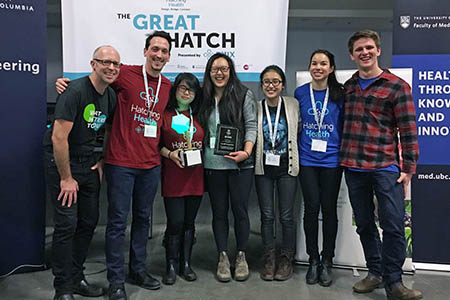
BeLeaf prototype
It may not look like much, just yet.
“It’s a prototype,” says Ben Guidolin, examining the light, perched slightly askew on top of a cardboard box, secured around the edges with duct tape.
But give it time, and this rudimentary model has the potential to become a new support tool for millions of Canadians who will face depression over the course of their lifetime.
“Depression affects so many people — some directly, and many more indirectly,” says Guidolin, a second-year UBC medical student and one of nearly 100 participants at Hatching Health, a weekend-long competition that brings together students and professionals from a wide range of disciplines to find real-world solutions to some of today’s most pressing healthcare challenges.
Over the course of the two-day event, Guidolin and his team — which included UBC students from the School of Social Work and the Mechanical Engineering Program, as well as Emily Carr students, and professionals in the field of design and chemical engineering — worked around the clock to create a new tool that would encourage those living with depression to regularly assess their emotional health, while fostering deeper connections with family or friends.
Their proposed product, known as BeLeaf, would come complete with two devices designed to resemble houseplants. Each synthetic plant — one for the individual living with depression, the other for their supporter — would be connected to a series of lights and a mobile app, which would serve as a self-assessment and support tool for users. As new data is entered into the app, the colour of the light emitted from each synthetic plant would automatically change, signaling the individual’s current state of mental health.

Team BeLeaf.
From left to right: Matthew Miller (MA Applied Communication), Ben Guidolin (B.Sc, Medical Student), Lily Wong (B. Social Work), Celine Hong (B.Des Industrial Design), Cindy Nachareun (B.Des Industrial Design), Jodie Hon (B.Eng Chemical/Biological) and Jack Dundas (B.Eng Mechatronics).
“We recognized pretty early on that it was important for us to not only create a mobile app, but to have a physical product that would enable people living with depression to express themselves and communicate with those who are special in their lives. Sometimes the hardest thing is starting the conversation,” says Guidolin.
The team’s proposed solution and prototype not only caught the attention of the panel of judges, but ultimately secured them one of the top prizes at the second annual event.
“It’s still early days, but I’m hopeful that we’ll see this product make a difference for people living with depression,” says Guidolin.
Ultimately, the team landed on the concept of a plant for the design, helping to draw the connection that mental health, like a plant, requires constant nurturing.
“It’s something you always have to be working on,” says Guidolin.
As one of two teams awarded this year’s top honour (the Pacific Health Innovation eXchange Grand Prize), the BeLeaf crew will now be looking to take their idea one step further — starting with a series of consultations with mentors through UBC’s Lean LaunchPad Accelerator Program.
Crossing disciplines brings new perspectives
While Guidolin can’t deny that being recognized as one of the top teams at this year’s competition is exciting, he says the true value of the weekend-long event is the opportunity to gain a new perspective by working across disciplines
“The challenges we face in healthcare can’t be solved just within the healthcare field — you have to look beyond, and take a collaborative approach,” says Guidolin. “For me, the event was about having an opportunity to connect and work as a team with people from different disciplines, from engineering, design, social work, and nursing.”

Hatching Health co-directors and distinguished guests.
From left to right: Rohit Singla (UBC Biomedical Engineering MASc Cand.), Mr. Paul Geyer (CEO, LightIntegra), Ms. Louise Turner (COO, PHIX), Arun Dhir (UBC MD Undergrad), Dr. Bruce Forster (MD, Head of the Department of Radiology), Mohammed Hasham (Research Program Manager, Genome BC) and Dr. Robert Rohling (Professor, UBC Mechanical and Electrical Engineering).
Creating more opportunities to connect across disciplines was precisely the inspiration for launching the student-led competition, say two of Hatching Health’s co-founders and UBC medical students Ameen Amanian and Daniel Raff.
“The idea of Hatching Health is simply that people from different backgrounds will be able to collaborate on tackling healthcare challenges in novel and exciting ways,” says Raff. “It is quite surprising how frequently these problems go unsolved due to a lack of technical and creative connections and resources. Our organization aims to correct just that.”
This event is proof that communication and collaboration can serve as a catalyst for innovation and positive change in healthcare.Bruce Forster
Now in its second year, the student-led competition only continues to gain momentum.
“To see the event grow and attract so many brilliant people from the health-tech community is really exciting; everyone wants to make a difference,” says UBC Biomedical Engineering student Cameron Stuart, who teamed up with Amanian and Raff to co-found the organization in 2016.
For the Faculty of Medicine’s Bruce Forster, who was recently appointed Academic Director of the Office of Education Innovation, Hatching Health is a perfect illustration of what can happen when ideas are given room to grow.
“It’s so exciting to see students and professionals coming together, crossing traditional silos,” says Dr. Forster, who was one of several speakers to give opening remarks at this year’s event. “This event is proof that communication and collaboration can serve as a catalyst for innovation and positive change in healthcare.”
This year’s event was co-directed by UBC’s Arun Dhir, a second-year medical student, and Rohit Singla, a Master of Biomedical Engineering candidate
For more information about Hatching Health, and a full list of team winners, visit http://www.hatchinghealth.ca/
Sponsors of the 2017 Hatching Health event included the Pacific Health Innovation eXchange (PHIX), the UBC Faculty of Medicine and Faculty of Applied Science, Genome BC, and many more.